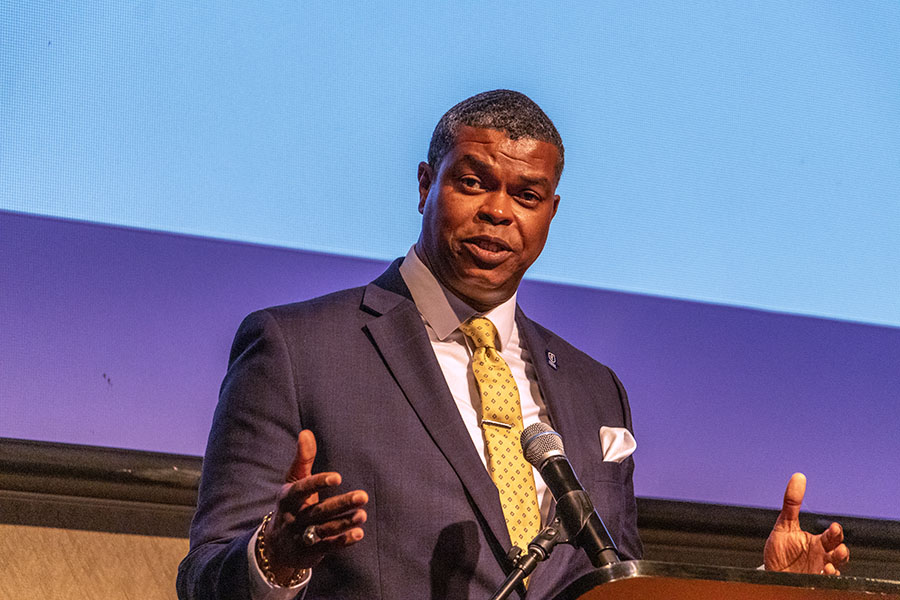Ithaca College administrators presented their plans to address decreasing enrollment and an increasing budget deficit to the students, faculty and staff gathered at the State of the College meeting Oct. 22. Administrators also outlined how the college will transition from the current strategic plan to a new strategic plan that focuses on long-term stability.
Enrollment
According to slides shown during the gathering, the college enrolled 1,128 new first-year and transfer students in Fall 2024, which fell below its target of 1,380–1,420 new students.
Rakin “Rock” Hall, vice president for Enrollment Management and Student Success, said factors outside of the college’s control — namely the COVID-19 pandemic and the 2023 FAFSA form’s changes and delayed timeline — played a large role in decreasing enrollment.
Hall explained that his team is using segment analysis to build better relationships with prospective students. Segment analysis gives colleges demographic data to help them target marketing to high school students.
Hall said applications the college received in August has grown from 31 applications in August 2013 to 177 applications in August 2024.
“We want a stronger push off in the start of August and September, so we’re having conversations with partners to better understand that,” Hall said. “We think if we can get out the gate with more of a sprint and have stronger numbers, that will endure and carry us.”
Finances
Tim Downs, chief financial officer and vice president of Finance and Administration, said lower enrollment will impact the college’s projected budget deficit.
Downs said the Board of Trustees approved a budget deficit of $12.5 million for fiscal year 2024, which ended June 30. However, the college overachieved its operating budget because its actual net revenue was $8.1 million higher than expected and its actual expenses were $2.3 million lower than projected. The deficit decreased to $4.1 million at the end of fiscal year 2024.
The Board of Trustees approved a $9.2 million projected budget deficit for fiscal year 2025, which started July 1, based on the college’s enrollment goal of 1,310 new students. Downs said the college expects the budget deficit to increase to $12 million this year because new student enrollment was approximately 200 students below target.
Downs said the college needs to close its budget gap between revenue and expenses. He said the college has seen non-salary budget expenses rise in addition to salary expenses increasing.
“As some of those contractual expense items grow, we have to adjust and figure out how we make reductions in other areas to hit our budget,” Downs said.
Downs said the college will evaluate its specific revenue target based on realistic enrollment projections and may consider decreasing it to make realistic budget projections.
“We have to work for budget certainty,” Downs said. “As we look in the years ahead, we’re trying to figure out what are the steps we need to do to bring our expenses in line with our revenues, and where are our revenue’s truly going to be.”
Plans to Balance the Budget
President La Jerne Cornish said the Board of Trustees has asked her to present a plan during the Feb. 2025 meeting about how the college can balance its budget by fiscal year 2028. Cornish said the college has had a budget deficit for the last three years, which is unsustainable.
Cornish said the college partnered with Huron Consulting Group to conduct an administrative analysis study earlier in the month. The college previously hired Huron Consulting Group in 2012 to analyze its finances and academic and administrative support to reduce costs.
Cornish said Huron will develop recommendations to “improve our institutional resilience” from the end of October to December; create a budgetary roadmap to reach a balanced fiscal year 2028 budget from December to February 2025, when Cornish needs to present the plan to the Board of Trustees; and align the fiscal year 2026 budget with the budgetary roadmap from February to March.
“It is important to recognize that this work is not solely focused on cost reduction,” Cornish said. “The college cannot cut its way to success.”
Cornish said Huron will facilitate interviews and focus groups with college leadership and a steering committee composed of Melanie Stein, provost and senior vice president for Academic Affairs; Kirra Franzese, associate vice president and chief human resources officer; Marc Israel, associate vice president for Business and Finance, Hall, Downs and herself.
Reaccreditation
John Fracchia, career engagement and technology specialist in the Center for Career Exploration and Development, and Te-Wen Lo, associate professor in the Department of Biology, presented an update on the Middle States Commission on Higher Education institutional reaccreditation process. Fracchia and Lo serve as the co-chairs of the middle states self-study and executive team.
Lo said the reaccreditation team completed the first step of the process, receiving approval for their self-study design from the MSCHE.
The reaccreditation team is now working on the second phase, the self-study report. The volunteers are split among each of the seven reaccreditation standards and are examining more than 300 pieces of evidence to see whether they align with those standards. The working groups are drafting chapters to be ready for initial review in November.
“We really want to highlight that this is really an all-campus activity, all hands on deck, and we’re trying to reflect and collect all of this data across all divisions and departments to tell our accurate narrative,” Lo said.
Cornish said the reaccreditation study will serve as a bridge between the college’s Ithaca Forever strategic plan, which ends in 2024, and the next strategic plan, IC Vision 2030.
IC Vision 2030 has five tenets: personalized experiences, community matters, Ithaca’s college, sustainable operations and recognized excellence. Cornish said the college is still forming IC Vision 2030 and will hold several conversations to shape the plan’s vision.
Closing
Cornish went off from her prepared remarks at the end of the meeting and asked attendees to have patience as administrators try to understand enrollment trends and take steps to move toward a balanced budget.
“This will be a year of study,” Cornish said. “We will have more information in March, which I will share with you. We will have even greater information in the fall of ’25 when we see what our incoming class is. … I will be as transparent as possible about this process.”
Cornish said that since she started at the college in 2018, she has seen the college community persist through several challenges. She called on community members to stick together to face the challenges ahead.
“I want to share with you my commitment and the commitment of my entire leadership team in whom I am very proud to stretching, not shrinking, as we undertake a year of analyses and reflections,” Cornish said. “The thing about stretching is this: that’s how you reach higher and higher.”









